|
BIOGRAPHIES
Source:
Genealogical & Biographical Record
of Miami Co., Ohio
Chicago: The Lewis Publishing Company
1900
< CLICK HERE TO RETURN TO
BIOGRAPHICAL INDEX of History Publ. 1900 >
< CLICK HERE to RETURN to
LIST of BIOGRAPHICAL INDEXES >
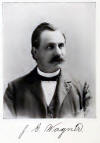
J. G. WAGNER
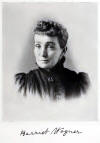
HARRIET WAGNER |
JACOB G. WAGNER
Source: Genealogical &
Biographical Record of Miami Co., Ohio - Chicago: The Lewis
Publishing Company - 1900 - Page 590 |
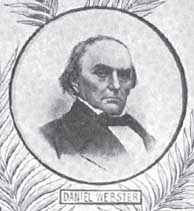
DANIEL WEBSTER |
Source: Genealogical &
Biographical Record of Miami Co., Ohio - Chicago: The Lewis
Publishing Company - 1900 - Page
|

DARIUS W. WEDDLE
RESIDENCE
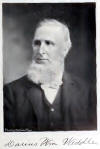
DARIUS WM. WEDDLE |
Source: Genealogical & Biographical Record of Miami Co.,
Ohio - Chicago: The Lewis Publishing Company - 1900 - Page
|
| |
SAMUEL S. WELLS is now
living a retired life in Tippecanoe City and well merits the
rest that is accorded him, for his life has been an accorded
him, for his life has been an active, useful and honorable
one. He is numbered among the native sons of Miami
county and is one of its oldest residents, for his birth
occurred in Monroe township, on on the 8th of February,
1821, so that the period of his connection with the county
covers seventy-nine years. His father, Silas Wells,
was born in Albemarle county, Virginia, and spent his
boyhood days in the Old Dominion. He was married there
to Miss Elsie Skinner. They had two children,
born in Virginia, Thomas and Richard, the
latter now deceased. Determined to seek a home in the
Buckeye state, they journeyed by team to Miami county in
1819, locating in Monroe township. They first lived
with his father, Samuel Wells, who had come to Ohio a
few years previous. Later Silas Wells removed
to a wild tract of land, upon which he erected a log cabin,
containing one room. The upper story or loft was
reached by a ladder, the doors were hung on wooden hinges
and the furniture was not only primitive, but scanty.
They experienced the various hardships and trials of pioneer
life, but eventually their labors brought to them capital
which enabled them to add many comforts and conveniences to
their home. The father died in the eighty-second year
of his age. In his family were ten children, eight
sons and two daughters.
Samuel S. Wells was reared on the old homestead
farm until he had attained his majority. He worked in
the fields and meadows through the summer months and in the
winter season pursued his education in the subscription
schools, having to walk a mile and a half to the school
house. There were also social pleasures enjoyed by the
pioneers that are unknown to the citizens of this day and
their busy lives were thus not unmixed with joy. On
leaving the parental roof Mr. Wells began learning
the cooper's trade and became an expert workman. He
followed that business for about eighteen years and then
returned to the old homestead farm where he lived for three
years. On the expiration of that period he went to
Shelby county, Ohio, but after a few months returned to the
old homestead, where he continued for two years. He
then traded his farm for property in Tippecanoe City, but
afterward moved to another farm in Monroe township, where he
remained for four years. Subsequently he lived upon
still another farm, and a part o the year 1897 he spent in
Tippecanoe City. Once more he became identified with
agricultural pursuits, but in November, 1899, again came to
Tippecanoe City, but afterward moved to another farm in
Monroe township, where he remained for four years.
Subsequently he lived upon still another farm, and a part of
the year 1897 he spent in Tippecanoe City. Once more
he became identified with agricultural pursuits, but in
November, 1899, again came to Tippecanoe City, where he is
now living retired, enjoying the rest which he has truly
earned and richly deserves.
In 1843 Mr. Wells was married to Miss
Caroline Lavy, and to them have been born eight
children: Harriet, Matilda, Emma, Margaret, Libbey,
Jefferson, Walter Grant and Eva. Mr. Wells
is still the owner of sixty acres of land. He has
served as trustee of Monroe township for one term, and in
politics he has long been a Democrat. He
holds membership in the Christian work. His life has
been an honorable one over which there falls no shadow of
wrong or suspicion of evil. He is undoubtedly one of
the oldest native sons of Monroe township and through the
passing years has watched the continual growth and
improvement of the community, bearing his part in the work
of advancement wherever he has found an opportunity.
He receives the respect of young and old, rich and poor, and
this work would be incomplete without the record of his
life.
Source: Genealogical & Biographical Record of Miami Co.,
Ohio - Chicago: The Lewis Publishing Company - 1900 - Page
245 |
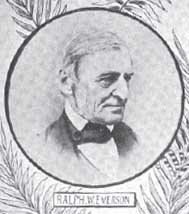
RALPH WELVERSON |
Source:
Genealogical & Biographical Record of Miami Co., Ohio -
Chicago: The Lewis Publishing Company - 1900 - Page
|
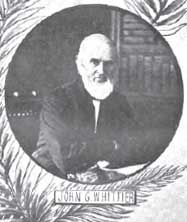
JOHN G. WHITTIER |
Source: Genealogical &
Biographical Record of Miami Co., Ohio - Chicago: The Lewis
Publishing Company - 1900 - Page
|
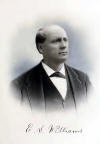 |
CAPTAIN E. S. WILLIAMS.
Elihu S. Williams was born in Bethel township, Clark
county, Ohio, on the 24th of January, 1835, and is the
eldest son of Rev. Henry Williams and Elizabeth
(Pettigrew) Williams. He worked upon the farm
until sixteen years of age, when he started in life for
himself. His education was such as could be obtained
in the winter schools of the country district in which his
parents resided. He worked for Major McCain
and Joshua Peck and John Peck, Jr., farmers,
residing near Troy, until he got money enough to pay his
board for a few months in Troy, when he studied and recited
to Prof. Arnett, of Troy, until he was able to pass
an examination entitling him to a teacher's certificate,
which he obtained from Professor Edwards and
Barton S. Kyle, county examiners for Miami county.
He taught school in the winter of 1851-52 in Brandt, and in
the meantime he continued his studies, reciting to
Professor Thomas Harrison, of New Carlisle. After
the end of the term he attended the academy in New Carlisle
during the spring term. In the summer months he worked
among the farmers, and then obtained another certificate
from the same examiners in Troy, and taught school in the
Kepper school-house during the winter of 1852-53. At
the close of his term he again attended Linden Hill Academy,
in New Carlisle, during the spring and fall terms, when he
again went to work until he earned money enough to pay his
tuition for the first and second years in the preparatory
school at Antioch College, when his money gave out, and he
became discouraged and gave up (much to his regret in after
life) his plan or rather hope of obtaining a collegiate
education. He went to work again until he earned and
saved some money, when in 1858 he commenced reading law in
the office of F. P. Cuppy, of Dayton, Ohio, and by working
in harvest fields and teaching in the winter he supported
himself until February, 1861, when he was admitted to
practice by the supreme court of Ohio. He then went to
Illinois, prospecting for a location, and while there Fort
Sumter was fired upon. He returned to Ohio for the
purpose of enlisting in an Ohio regiment, but before he
reached home Ohio's quota was full. He then located in
Celina, Mercer county, Ohio. When the second call for
troops was made he enlisted and helped raise Company A,
Seventy-first Ohio Volunteer Infantry, and on the 5th of
October, 1861, he was elected first lieutenant of the
company and was commissioned Feb. 14, 1862, and promoted to
captain Feb. 10, 1863. He was in the battle of Shiloh.
His captain being slightly wounded on Sunday morning, he had
command of the company during the bloody battle of that day,
and fought with his troops until night closed the fierce
contest. Captain Williams was with the brave
Major Hart at Fort Donelson when the rebel colonels,
Woodward and Johnston, with their commands, attacked four
companies of the Seventy-first and were repulsed. He
was with the regiment in all its marches and skirmishes
until September, 1863, when, although he was the fifth
captain in the line of his regiment, he was sent by
General Payne with three companies of the
regiment and a section of artillery to take charge of the
post at Carthage, Tennessee. The post was established
by General George Crook with a
division, and afterwards held by General Spears with
a brigade. There was a large accumulation of
government stores there for the use of the army, which could
not be moved on account of the low water in the Cumberland
river. The post was thirty-six miles from any other
military post, and the Confederate commands of Colonel
Hughes and Colonel Hamilton, estimated
from one thousand to fifteen hundred men, were in striking
distance, but Captain Williams held the post
until the river rose, so that the government stores could be
removed to Nashville and thus saved. His troops not
only held the post, but a part of them, mounted upon horses,
captured and "pressed" from the rebels, rendered efficient
service in driving the guerrillas out of the country and
protecting the loyal citizens of that part of Tennessee.
His camp was made a recruiting station for loyal Tennesseeans
and Kentuckians and by the spring of 1864 a regiment was
recruited, which under the command of Colonel A. E.
Garrett did effective service for the Federal cause.
By the request of Andrew Johnston, then
military governor of Tennessee, Captain Williams
was detailed for organizing troops in Tennessee, and
remained in Carthage until the close of the war.
After the close of the war Captain Williams
remained in Smith county, Tennessee, and engaged in the
practice of law. He also took an active part in the
reconstruction of that state, and was a member of the first
convention held in Nashville for that purpose. In
April, 1865, he was commissioned attorney general of the
sixth judicial district of the state, and held that position
until the summer of 1867, when he resigned to accept the
Republican nomination for the legislature to represent the
legislative district of Sumner, Smith and Macon counties.
The campaign which followed was exciting and at times
dangerous, but he was elected by a handsome majority, and
received the largest vote ever given to a Republican in
those counties. He served two years in what is known
as the radical Republican legislature of Tennessee. He
took an active part in the legislation of what history calls
the Brownlow legislature of Tennessee, and retired at the
close of the term with the confidence of his party and the
respect of the people. He declined a renomination, and
refused to become a candidate for any political office. He
remained in Tennessee until 1875, and was an active worker
in the Republican party, fighting the battles all the more
earnestly, because the party in middle Tennessee was
proscribed, persecuted and in a hopeless minority.
In January, 1875, he returned to Ohio and formed a
partnership with his brother. Judge H. H. Williams,
of Troy, to practice law, and has resided in Troy up to the
present time. He continued the practice of law after
Judge Williams was elected common-pleas judge
until 1886, when lie was nominated by the Republicans of the
third congressional district of Ohio as a candidate for
congress. The district was then regarded as Democratic
by a majority of from five to eight hundred. The
Democrats nominated Hon. R. M. Murray, a popular man,
who represented the district from 1882 to 1884. After
a hard-fought campaign Captain Williams was
elected over Mr. Murray by a majority of
eleven hundred and thirty-three. In 1888 he was
nominated by acclamation, the Democratic candidate being
Hon. George W. Houk, a very talented and popular man, a
leading citizen and a lawyer of Dayton, Ohio. Again
there was a close campaign, and it was expected that Mr.
Houk would be elected by a fair majority; but, to the
surprise of all parties, Captain Williams
received twenty thousand nine hundred and twelve and Mr.
Houk twenty thousand four hundred and ninety-seven
votes.
In the fifty-first congress Captain Williams
was a prominent member of the military committee, and
made the record of an able, watchful, industrious member.
At the end of the second term the district was
gerrymandered, throwing Miami county in a district
Democratic by thirty-five hundred majority. Captain
Williams was not a candidate, and has not since then
been a candidate for any office in the gift of the people.
His career in congress was such that he won the reputation
of being devoted to his constituents and untiring in his
work for the interests of his district.
When he returned to private life he engaged to some
extent in the practice of law, but devoted most of his time
to journalism, being, since the spring of 1891, engaged in
the publication of the Troy Buckeye until September, 1899,
when it was sold to W. C. O'Kane and A. S. Hoffman.
Under his editorial management the Buckeye prospered and
became a valuable newspaper plant. It is for the
present generation of the citizens of Miami county to judge
of his ability as an editorial writer.
In Smith county, Tennessee, Captain Williams was
married, on the 31st of May, 1866, to Alice Gordon,
the daughter of Dr. Wiley B. and Virginia (
Russwurm ) Gordon. Dr. Gordon's father,
before the war, was a planter and owned a large number of
slaves. His wife's father was General John S.
Russwurm, of Rutherford county, Tennessee. Dr.
Gordon was a soldier in the Seminole war and a
soldier under General Sam Houston in the war
of Texas with Mexico. He was a physician, earnestly
devoted to his profession and died of cholera in Memphis,
Tennessee, in 1849. His wife died in Rutherford
county, Tennessee, in 1841. Two children came to the
home of Captain Williams: Olive
Gordon and Henry, both of whom were born in
Tennessee. The son died in Troy, Dec. 5, 1885. The
daughter, Olive G. Williams, is a graduate of the
Troy High School, and for a number of years had charge of
the local columns of the Buckeye. She has traveled
extensively for a young lady, and with her uncle, Judge
Williams, made a trip around the world, traveling
east until she arrived at her home in Troy. She is a
writer of more than ordinary ability.
This biographical sketch is the record of an active,
busy life, full of disappointments, with here and there a
gleam of success. Whatever has been accomplished by
Captain Williams has been due to energy,
perseverance and hard work, for nature did not give him
genius, nor schools an education. He was never ashamed
of the poverty of his youth, or the fact that he was a day
laborer. For him the energy of youth and the vigor of
manhood have passed; there remains only the years of old age
and the hope that his life has not been a failure.
Source: Genealogical & Biographical Record
of Miami Co., Ohio - Chicago: The Lewis Publishing Company - 1900 - Page
234 |
| |
H. H. WILLIAMS.
It is only the few that achieve success and win character
and reputation above the ordinary on the broad field of the
battle of human life. To some fame and reputation come
without an apparent effort, but generally fortune favors
those whose earnest, untiring energy conquers success.
Henry Harrison Williams, the third son of
Henry Williams and Elizabeth (Pettigrew)
Williams, was born in New Carlisle, Clark county,
Ohio, Feb. 9, 1840. His grandfather, Henry Williams,
was born on New river, Greenbrier county, Virginia, in 1770,
and was the son of George Williams, who came
to America from Wales prior to the Revolution and settled in
Virginia. Henry Will Williams was
married, in October, 1797, to Elizabeth Albert, who
was born in North Carolina. She went to Greenbrier
county, Virginia, to visit her brothers, James and
Jacob Albert, and there Henry Williams
met, courted and married her. They lived in Virginia
until they had four children, when, attracted by the fame of
the fertile lands of the Miami valley, they concluded to
emigrate to Ohio, over the mountains, across the rivers and
through the pathless forests, and make for themselves a home
in the new state. They were six weeks on the journey,
which was made on horseback in the summer of 1805.
They crossed the Ohio river at Gallipolis and reached the
home of his brother, Captain John Williams, in Bethel
township, Miami county, in July; Henry Williams was a
grand type of the old pioneer stock. A man of deep
religious convictions, he was ever ready to help a neighbor,
ever willing to extend aid to the needy. He served as
a soldier in the war of 1812.
Henry Williams, junior, the father of H. H.
Williams, raised a family of five children, four sons
and one daughter. Three of the sons were soldiers in
the Union army in the war of 1861. He died Nov. 13,
1889, aged eighty-four years, eight months and thirteen
days, leaving behind him the record of a useful life.
His wife, Elizabeth (Pettigrew) Williams, was born in
Rockbridge county, Virginia, Oct. 30, 1806. She was
married to Henry Williams, junior, in
1832, and died Dec. 23, 1869. She had a quick, active
mind and rare good judgment. She fulfilled every duty
of a true, affectionate wife and of a faithful, loving,
tender mother.
H. H. Williams, the subject of this sketch, was
educated in a country school, with the addition of two terms
at Linden Hill Academy, at New Carlisle, Ohio, under
Professor Thomas Harrison. He taught school two
years and then entered as a student the law office of
Conklin & Mathers, of Sidney, Ohio. In the
spring of 1861 he left the law office to enlist in the
Fifteenth Ohio Infantry for three months, and served under
General McClellan in the West Virginia
campaign, and was in the battle of Philippi. On the
9th of October, 1861, he enlisted at Camp Tod, in Troy,
Ohio, in Company A, Seventy-first Ohio Volunteer Infantry,
and served with the regiment until he was severely wounded
in the right hip at the battle of Shiloh and was taken
prisoner. For four months he was confined in rebel
prisons and he was then exchanged and rejoined his regiment,
but he became so lame from the results of his wounds that on
June 11, 1863. he was discharged on a surgeon's certificate
of disability.
He resumed the study of law under Judge
Conklin of Sidney, Ohio, and was admitted to the bar in
September, 1864. He opened an office in Troy, but on
account of his health he was compelled to suspend active
practice, which he resumed, however, in 1870, in Troy, where
he has resided since that date. In October, 1871, he
was elected prosecuting attorney and re-elected in 1873,
thus serving four years. During his terms of office be
obtained the reputation of a capable, vigorous official.
In December, 1877, he was appointed by Governor
Thomas Young to the position of common pleas judge of
the second judicial district of Ohio to fill the vacancy
made by the death of Judge George D. Burgess, and so
well did he discharge the duties of that office that in
October, 1878, he was elected judge without opposition.
At the expiration of his term of office he resumed the
practice of law, although his disability from his wound
increased, notwithstanding the best medical attention, until
he lost the entire use of his legs, yet by his determined
and untiring energy be has mastered the profession of law
until be is recognized as the leading lawyer of the Miami
county bar, and has had for years a large and lucrative
practice. When common pleas judge he held court in
Champaign and Miami counties, and found the docket in each
county so far behind that delay in reaching cases amounted
to almost a denial of justice, yet by his executive ability,
persistent and untiring work, he left the docket of both
counties with the business well in hand.
Judge Williams' large practice has
brought him not only a competency but wealth, and while in
this sketch the writer has no space to relate his triumphs
at the bar, for he is an able advocate before the jury as
well as a close, logical reasoner before the court, yet it
is safe to say that no man in Ohio has accomplished more in
winning reputation and wealth under adverse circumstances.
For many years he has been a helpless invalid, requiring a
constant attendant, yet he was in active practice until
October, 1899, when he concluded to travel around the world.
Attended by his faithful wife and his son, Lloyd
Williams, and accompanied by his niece. Miss
Olive G. Williams, he embarked at New York city traveled
across the Atlantic ocean, journeyed through England,
Scotland, Ireland, France, Italy and Austria, across the
Mediterranean sea, through the Red sea, over the Indian
ocean, through India, in China, Japan, across the Pacific
ocean by way of Honolulu to San Francisco and from there
across the continent to his home in Troy, without a single
mishap or the missing of a single train. He is now
actively engaged in the practice of law.
On the 25th of February, 1864, Judge Williams
was married to Miss Eloise J. Anderson, the daughter
of Nathan and Margaret Anderson, of Bethel township.
Miami county, Ohio. To this union were born six
children; two sleep in the cemetery, and three daughters and
one son are living.
Judge Williams is a member of the
Franklin Lodge, F. & A. M., and a Knight Templar in the
Coleman Commandery of Troy, Ohio. He is also a member
of A. Coleman Post. G. A. R., of Troy. In
religion he is a member of the Methodist Episcopal church of
Troy. In politics he is a Republican, with decided
convictions that the party is right on finance and
expansion, and he believes in the future of this republic as
one of the prominent factors in the progress and
civilization of the world.
In recent years Judge Williams has
devoted much time to good literature, and as a writer he is
clear, instructive and attractive. His letters of
travel in the county papers have attracted more than local
attention. His life has been one of constant work and
employment, but he is now disposed, as he nears the sunset
shore, to enjoy in his own way the rest and comfort due to
old age.
E. S. W.
Source: Genealogical & Biographical Record
of Miami Co., Ohio - Chicago: The Lewis Publishing Company - 1900 - Page
294 |
| |
WILLIAM WILLIAMS.
William Williams is one of the most venerable
citizens of Miami county and is a native son of Ohio, his
birth having occurred in this County ninety years ago.
His grandfather, Michael Williams, was one of
the earliest settlers of Ohio. He was born in Wales
about 1734, and during his boyhood came to America with his
parents and an uncle. A short time after reaching the
new world Michael and his father settled in North
Carolina, where some time afterward the father was
accidentally drowned. His widow later became Mrs.
Price.
Michael Williams was reared to manhood in
North Carolina and there married Barbara Summa.
He served throughout the Revolutionary war under General
Washington, loyally aiding in the struggle for
independence. Removing his family to Greenbrier
county, Virginia, now West Virginia, he engaged in farming
there until 1798. In the spring of that year he sent
his eldest son, George, and his son-in-law, John
Mann, to the Northwest Territory to locate a claim,
make a clearing and plant a crop of corn, so that the family
would have something to live on when they came. After
reaching Ohio the son and son-in-law located a claim on Mad
river, near what is now the city of Dayton. At that
time, however, it contained two huts, and some French
traders were the representatives of its business interests.
After carrying out the instructions of the father the young
men returned to Virginia, and the family, with others,
started for the Buckeye state, in the fall of 1798.
The colony was made up of people who represented different
religious denominations, but all met in general worship.
They would make an early start each day and do their cooking
and pasture their stock on the way. At twilight they
would camp for the night at some good watering place and at
Gallipolis they crossed the Ohio river into the state which
was to be their future home. One day, however, all the
men went to hunt wild game in order to replenish their
larder. One of them shot a huge buffalo bull, but was
unable to find him as he ran for a long distance after being
wounded. The next day they again started out to hunt
for bear and by good luck found the dead buffalo.
After spending one year near Dayton the Williams
family removed to Honey Creek, this county. The
father went to Cincinnati on a visit and there met
General Harrison, who told him of the beautiful
prairie on the Stillwater; so, in 1800, he removed to Newton
township, Miami county, where he made a squatter's claim,
for the land had not yet been surveyed. He secured a
half-section of land on which there was a small prairie;
that was afterward known as Williams prairie and
bordered on the Stillwater river. His son-in-law,
Peter Price, settled on a strip of land adjoining
the Williams claim, but Mr. Price had a
quarrel with an Indian and in the encounter killed him,
which incurred the ill will of the tribe, and he was
therefore forced to abandon his farm. Michael
Williams located all of his sons upon the
half-section. He was a cooper by trade and followed
that pursuit in connection with farming. He died about
1819 and was buried in Pleasant Hill cemetery. Both he
and his wife were of the Episcopal faith and they reared
nine children: Mary, who became the wife of Peter
Price and removed to Vincennes, Indiana; Catherine,
who became the wife of Jacob Williams and
resided near Greenville, in Darke county, Ohio; Barbara,
wife of John Mann, who finally located with
his family in Shelby county; Elizabeth, who became
the wife of William Mann; Frances, who married
Nathaniel Hill and died at Pleasant Hill;
George, who wedded Mary Long and settled
on part of the land which his father entered; Michael,
who became the father of our subject; Henry, who
married Elizabeth Page and located on
William prairie, and John, who wedded Mary
Yunt and died on the old homestead farm.
Michael Williams, Jr., was born in North
Carolina in June, 1780, and accompanied his parents to Ohio.
He was self-educated and was a self-made man, owing his
advancement and success in life entirely to his own efforts.
In 1807 he was married, in Miami county, to Elizabeth,
a daughter of William Long, a pioneer of Newton
township. During the, war of 1812 Mr.
Williams was a member of the home guards, a company
which was stationed at a block house built about
three-fourths of a mile west of what is now Pleasant Hill,
during which time he was appointed adjutant. He was
employed by a couple of French traders who made their
headquarters at Staunton, in buying furs from the Indians,
and when a sufficient number had been purchased he would
make trips with pack horses to Waupakanati. Fort
Wayne, Detroit and other posts to dispose of them. He
taught school in Newton township in the winter of 1815-16
and for years continued to teach subscription schools in
that township.
Source: Genealogical & Biographical Record
of Miami Co., Ohio - Chicago: The Lewis Publishing Company - 1900 - Page
820 |
| |
JOHN C. WRIGHT.
John C. Wright, of this review, who is farming in
Concord township, Miami county, and is serving as assessor
of the township. a position which he has acceptably filled
for the past ten years, was born in 1842, on the farm where
he now resides, his parents being Elliott and Catherine
(Myers) Wright. His paternal grandfather
removed from Virginia to this county when Elliott was
quite young and entered from the government a tract of land
which has since been in possession of his descendants. The
Myers family came from Pennsylvania to Ohio.
The parents of our subject were well-known and esteemed
farming people of Concord township, where the father died in
1850, at the age of thirty-eight years, the mother in 1855,
at the age of thirty-three years.
John C. Wright, of this review, spent his
boyhood days upon the old home farm, and his labors in the
field were alternated by attendance at the district schools.
He married Miss Sarah Rudy, a daughter
of Samuel Rudy, of Newton township, and to
them were burn the following children: Samuel
Elliott, now a farmer of Newton township, who married
Miss Armina May Helmick, a daughter
of Philip Helmick; Maggie Elizabeth,
wife of John Rontzong, a farmer and trustee of
Van Buren township, Darke county, Ohio, by whom she has two
children, John Omer and Ruth; John
Carlton, an agriculturist of Concord township, who
wedded Mary E., a daughter of William
Fleming, and has one son, George Stanley;
Hannah Mary, wife of Abijah Swab, of
Darke county, by whom she has two boys, George and
Herman; and Charles Irvin, who married
Miss Lida Deitrich, and has a son,
Edgar. After the death of his first wife Mr.
Wright was again married, his second union being with
Catherine Caroline Bubeck, a daughter of John
Bubeck, of Darke county. His wife bore the maiden
name of Mary Baisch, and both were natives of
Germany. Mr. and Mrs. Wright now have one son,
Herman Walter, a promising young man of
seventeen years who is still at home with his parents.
During the civil war Mr. Wright manifested his
loyalty to the Union by enlisting in the Fifty-seventh Ohio
Infantry for three years, but after fourteen months, on
account of disability, he was honorably discharged. He
participated in the battle of Shiloh and many engagements of
lesser importance. With the exception of the time
spent at the front Mr. Wright has always
resided upon the old homestead farm in Concord township,
where he owns eighty acres of rich land, all of which is
under a high state of cultivation. His home is one of
the finest residences of the neighborhood, and the barns,
outbuildings and fences are kept in good repair and indicate
the careful supervision of the owner, who is regarded as one
of the most practical, progressive and prosperous farmers of
his neighborhood. The esteem in which he is held by
his fellow townsmen is shown by the fact that he has served
for ten consecutive years as township assessor. This
is a township in which a Democrat never holds office except
as a special mark of great confidence on the part of the
community, for the majority is usually overwhelmingly
Republican. He is most true and loyal to the trust
reposed in him, and is a man whose public and private record
are alike beyond reproach.
Source:
Genealogical & Biographical Record of Miami Co., Ohio -
Chicago: The Lewis Publishing Company - 1900 - Page 468 |
| |
THOMAS M. WRIGHT.
The liberal patronage which is accorded Dr. Thomas
Melville Wright is tlie best indication of his superior
ability as a physician and surgeon. His comprehensive
knowledge and his accuracy in applying the principles of
medicine to the mastery of disease has gained him creditable
prestige, and he is accounted one of the foremost members of
the medical fraternity in Troy. His birth occurred
Oct. 5, 1848, in Montgomery county, Indiana, his parents
being James W. and Nancy (Fugate) Wright, natives of
Russell county, Virginia. The father was born in 1811
and the mother in 1814, her death occurring in Boone county,
Indiana, in 1852. The father died in Troy, Ohio, in
1897, having devoted his entire life to agricultural
pursuits and to the practice of medicine. With his
family he removed to Indiana about 1836, but his last days
were spent in the Buckeye state.
Thomas M. Wright acquired his preliminary
education in the common schools, after which he entered the
National Normal University at Lebanon, Ohio, in which
institution he was graduated with the class of 1870.
He had engaged in teaching for two years prior to entering
the normal, having had charge of a school at Blue Grass,
Illinois. It was in that way he acquired the capital
necessary to meet his expenses in school. After his
graduation he resumed teaching, which he followed for four
years, spending one year as principal of the high school in
Crawfordsville, Illinois. In 1872 he began the study
of medicine, and in 1874 abandoned the work of the
schoolroom altogether in order to give his entire time to
the mastery of the principles of medical science. His
reading was directed by Dr. Nelson Walkley, of Troy,
Ohio, and he was graduated in the Kentucky School of
Medicine in 1876. Immediately afterward he opened an
office in Troy and has since engaged in practice, securing a
large and liberal patronage. He has performed many of
the most important abdominal operations in the county,
including operative surgical work for ovariotomies,
strangulated hernia, ectopic gestation, cæsarian
section and appendicitis. He is a member of the Miami
County Medical Society, of the Ohio State Medical Society
and of the American Medical Association, and is a close
student of his profession, keeping in touch with its
continued progress and advancement.
In 1871 occurred the marriage of Dr. Wright and Miss
Angeline Mendenhall, of Miami county. She died m
1879, leaving a son, Thomas M., and the Doctor was
again married, in 1880, his second union being with Miss
Emma A. Albaugh, of Miami county, by whom he has a
daughter, Angeline Bracken. In his political
views a Republican, he keeps well informed on the questions
of the day, but is no aspirant for political honors.
He has taken all the Yorkrite degrees of Masonry, and is a
member of the Methodist Episcopal church. His direct
regard for the ethics of his profession, his wide knowledge
and his careful attention to his business have won him
prominence and success.
Source:
Genealogical & Biographical Record of Miami Co., Ohio -
Chicago: The Lewis Publishing Company - 1900 - Page 502 |
NOTES:
|
![]()
![]()








